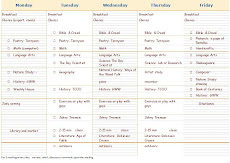
I put this (left) in the front of Kieron's binder so that we can see his readings and other activities at a glance.
Today I showed him his supplies, such as they are (below) -- he was happy about having his own writing supplies, scissors, and container to hold them in : ).
We continued the math review (Properties of Multiplication) and then some more Latin vocabulary and grammar and Greek alphabet and pronunciation review.
I gave him We Went with Magellan to read to start him off on our history. I went over a bit of an overview of history with him. So far I have not given him anything to do on his own besides reading, but I think that soon I will give him some sort of beginning writing project.

So today it was:
- Math
- Greek
- Latin
- History
- Nature Walk (we went out and tried to ID some species in our area)
The little ones' reading lesson went rather better today. Aidan just did review. With Paddy, it is interesting because he can already read quite a bit with almost no decoding ability. My goal is to give him some word attack skills.
I have researched lots about beginning reading, through the years. The "whole language" people have the right idea in that reading really is NOT a matter of decoding isolated or even nonsense words. Words have meanings and because of the way language is structured, their meaning is usually a part of a longer unit, ie a sentence. More and more, it seems to me to be an insult to a child's intelligence to have them read completely twaddly garbage sentences just to reinforce phonics.
At the same time, word-guessing is a really troublesome habit, and so the discipline of phonics as a basic strategy is very much needed. I like Spell to Read and Write's approach of teaching many words and waiting until that is mastered before having the child read sentences, so that he or she can start right off reading good easy books when the basic knowledge is in place.
Yet, with my kids at least, isolated words do not stick. My little kids learn from the big picture, not from micro-drilling. So I've been doing both -- some drills, and then words in sentences.
In one way, Paddy's extensive sight-reading vocabulary is an advantage, because I can write little stories using (1) phonics words and (2) familiar sight words. The disadvantage is that he plunges at the sentence and guesses at what he does not know. So I'm slowly trying to teach him to slow down and use phonics clues.



No comments:
Post a Comment